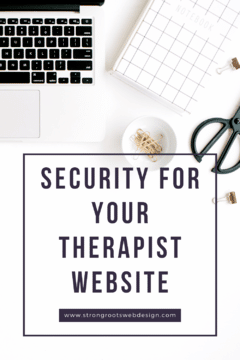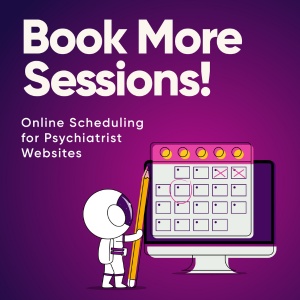Are you making sure your therapist website visitors feel safe? Do i need an SSL certificate for my website? THE ANSWER IS A BIG YES!
Understanding how to make your therapist website secure by having an SSL is a crucial step to having a successful website.
The online world is constantly evolving and changing. As more and more people come online, there is a bigger and bigger push for security and transparency in all of our online interactions.
While this is a good thing overall, it can also be confusing for small business owners, who aren’t always in the know of the most recent changes in the way the online world is working.

Making sure that your therapist website is secure means taking a few extra steps to certify that the website you are running is really what it says it is. This is done through a Secure Sockets Layer certificate, or SSL.
The whole purpose of an SSL is to verify that your website is legitimate, and that people who, for example, fill out a contact form on your site can be confident that the information on the form is going to who they are actually trying to contact.
This way, users can be confident that when they interact with your website, or submit information through an online form, that information is actually going to the right place.
It used to be that you only needed a secure site if you were going to be actually handling financial transactions online. You may still find people who will tel you that, if you aren’t going to be handling credit card numbers or other personal financial information, you don’t need to worry about securing your site.
This is the kind of advice that is well intentioned, but can end up doing a lot of harm to your private practice.
The truth is, things have changed.
For one thing, people are a lot more cautious now than they were in the past about even sharing their e-mail addresses. But more than that, people in general want the security of knowing that the websites they are interacting with are really what they say they are.
And as a therapist, it is extremely important to ensure security for your therapist website. This is not only because it will make visitors to your website more comfortable, but because browsers have begun penalizing websites that are not secure.
As internet users get more and more savvy, platforms like Google and Firefox are aware that users really value security when using to web. To respond to this, most platforms are now actively penalizing sites that do not have an SSL certificate.
This means that, if your site isn’t secure, Google will move you down in the rankings when someone does a search. Since they are now evaluating your site quality in part based on whether or not you have an SSL certificate, if you don’t have one, they will be less likely to show your website to people who are searching for you.

(To learn more about how to show up in the search results when a potential client does an internet search, check out my blog post on How to be SEEN Online. You can also sign up here for my free video course, where we go in-depth on this, and many other super helpful topics relating to your therapist website!)
And, when people DO click on your site, their browser may warn them away.
Many browsers now will display a warning or red stop sign symbol to visitors, warning them that the site they are viewing is not secure.
If you are trying to build a sense of trust with a potential client, having a warning like that pop up on your site is the very last thing you want to have happen.
Do I need an SSL certificate for my website? = Do I want my website be secured?
If you don’t know the answer to that question . . . well you should know by now that the answer to the first question is a resounding YES.
In general, you can tell from the URL of a therapist website if is secure. If the url for your website says, “http://www.yourawesomepracticename.com” then your site is NOT secure. If it says, “https://youraweseomepracticename.com” then your site IS secure. (“Secure” is what the “S” stands for!)
But another very easy way to check the status of a website is to visit SSL Shopper. Their free service will let you search for the status of a website, and is an easy way to get an answer to your question.
If your website isn’t secure, what should you do?
The answer to this question will vary, depending on where your website is hosted. You may want to contact your website hosting company, and ask for step-by-step instructions for how to secure your site.
You can also try simply googling the name of your hosing company and the phrase “get SSL.”
If you don’t feel up to DIYing, simply contact me and I can take care of it for you. The good news is, this can usually be fixed fairly quickly, and then you can rest easy knowing that visitors to your therapist website will feel secure, and that search engines will recognize your website as the high-quality site that it is.
Podcasts and Guides for Starting Your Private Practice:
- 10 Therapist Podcasts You Should Be Listening to in 2021
- What You Need to Know About Starting a Telehealth Private Practice
- Do I Need An SSL Certificate For My Website – Security for Your Therapist Website
- Custom vs template website: Which One Works Best for Your Therapy Practice?
- New Podcast For Therapists
- Eight Questions to Ask Yourself When Starting a Private Practice in Psychology
- The Impact of Occupational Therapy Slogans on Patient Motivation
- How to Start a Therapy Practice Online: How To Offer It Successfully
- Personal Branding for Therapists : Attracting Your Ideal Clients
- Starting a Private Practice in Counseling! – Therapist Websites
- The Benefits and Drawbacks of a Counseling Website Template: A Comprehensive Guide
- The Best Therapist Websites of 2022!
- Ten Great Therapist Website Examples
- Are Paid or Free Therapist Directories Worth It? A Definitive Guide
Need any of the following?
- Web Design And SEO Services
- Done-For-You Therapist Website Template
- Professional and Customised Web Design
Here are some Sample Websites We’ve Created:
Check out our Portfolio for more!
Hi! I’m Sarah.
I help counselors and therapists have a bigger impact on the world through better client connection. I do this by creating beautiful visuals and strategically designed websites.

Pin me!








2 thoughts on “Do I Need An SSL Certificate For My Website – Security for Your Therapist Website”
Let’s connect to get my website secure. We have been messaging on LinkedIn. My website has been hacked. When you got to me on google.com and click for my website it takes you somewhere else.
Hi Andrew – So sorry that you had this stressful experience! Glad we could connect on LinkedIn.